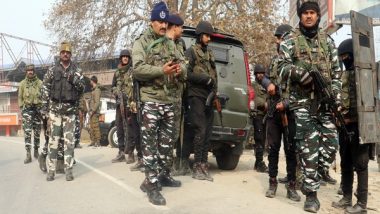New Delhi, December 30: The Centre on Thursday extended the Armed Forces Special Powers Act, 1958 or AFSPA in Nagaland for another six months, mentioning that the state is in such a "disturbed and dangerous condition" that the use of armed forces in aid of the civil power is necessary.
The announcement was made through a gazette notification issued by the Ministry of Home Affairs amid calls from the Northeastern state to withdraw it after the alleged botched security operation near Oting Village in Nagaland's Mon district that left 14 civilians and one jawan dead on December 4.
"Whereas the Central Government is of the opinion that the area comprising the whole of the state of Nagaland is in such a disturbed and dangerous condition that the use of armed forces in aid of the civil power is necessary," the notification said.
"Now, therefore, in exercise of the powers conferred by Section 3 of the Armed Forces (Special Powers) Act, 1958 (No.28 of 1958) the Central Government hereby declares that whole of the State of Nagaland to be 'disturbed area' for a period of six months with effect from December 30, 2021 for the purpose of the said Act," it mentioned.
Also Read | Apple Takes Action Against iPhone Assembler Foxconn After TN Factory Food Poisoning: Report.
The Armed Forces Special Powers Act (AFSPA), 1958 provides certain special powers to a member of the Armed Forces in areas in the Arunachal Pradesh, Assam, Manipur, Meghalaya, Mizoram, Nagaland and Tripura. The powers were also extended to forces deployed in Jammu and Kashmir as well.
Interestingly, the law was first introduced by the British to suppress the Quit India movement in 1942.
AFSPA confers special powers on the armed forces in areas deemed "disturbed". In a 'disturbed area,' a military officer can fire upon an unlawful assembly of five or more people if the need arises or even for illegal possession of firearms.
Moreover, according to the law, no arrest and search warrants are required for any operation.
It also provides protection to persons acting under Act, which means 'No prosecution, suit or other legal proceedings shall be instituted, except with the previous sanction of the Central Government, against any person in respect of anything done or purported to be done in exercise of the powers conferred by this Act'.
(The above story is verified and authored by ANI staff, ANI is South Asia's leading multimedia news agency with over 100 bureaus in India, South Asia and across the globe. ANI brings the latest news on Politics and Current Affairs in India & around the World, Sports, Health, Fitness, Entertainment, & News. The views appearing in the above post do not reflect the opinions of LatestLY)













 Quickly
Quickly


